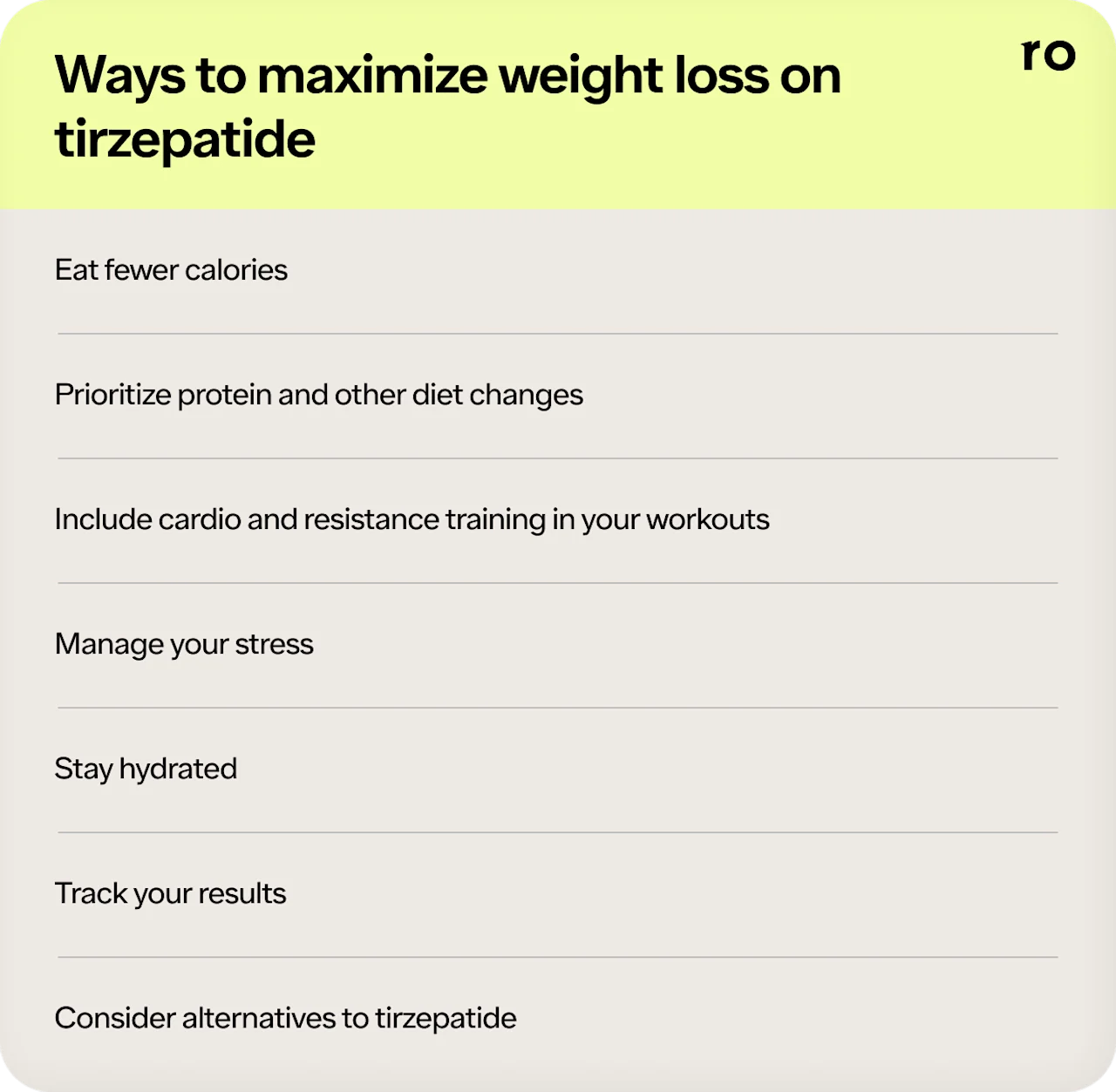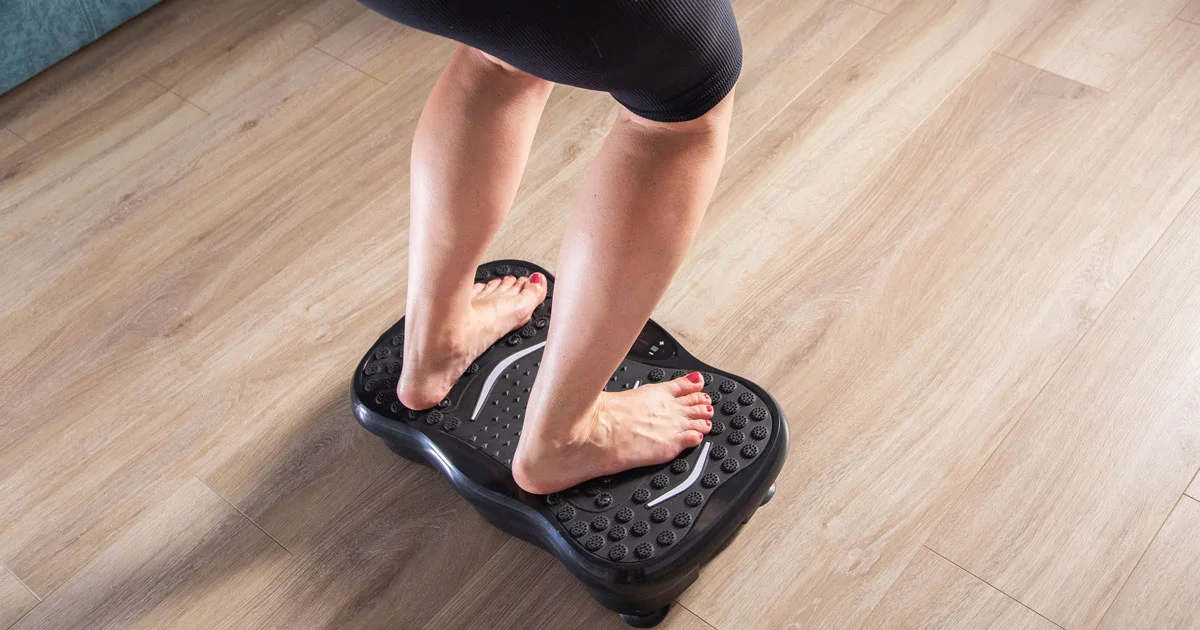Key takeaways
Tirzepatide (Zepbound, Mounjaro) can be highly effective for weight loss, but results can vary depending on your lifestyle, dosage, and personal health situation.
If you’re not losing weight on tirzepatide, possible explanations include inconsistent dosing, inadequate diet and exercise changes, or being on too low a dose.
Adopting a high-protein, low-calorie diet, incorporating cardio and resistance training, and practicing stress management techniques can help maximize tirzepatide’s effectiveness.
Here's what we'll cover
Key takeaways
Tirzepatide (Zepbound, Mounjaro) can be highly effective for weight loss, but results can vary depending on your lifestyle, dosage, and personal health situation.
If you’re not losing weight on tirzepatide, possible explanations include inconsistent dosing, inadequate diet and exercise changes, or being on too low a dose.
Adopting a high-protein, low-calorie diet, incorporating cardio and resistance training, and practicing stress management techniques can help maximize tirzepatide’s effectiveness.
Tirzepatide, the active ingredient in the drugs Zepbound and Mounjaro, has made waves for driving the most weight loss among the currently available options. But if you’re taking the medication and the pounds aren’t exactly melting away as you expected, you might be asking yourself, “Why am I not losing weight on tirzepatide?”
There could be a number of contributing factors, from your dosage to your diet. Read on as we explore possible reasons for slower weight loss on tirzepatide and share expert-backed tips on how to optimize your weight loss success.
Why am I not losing weight on tirzepatide?
“Several factors can impact the rate and total amount of weight loss on tirzepatide,” says Fernando Ovalle, Jr., MD, ABOM, a double board-certified plastic surgeon and obesity medicine specialist. These factors can include your starting body weight, dosage of tirzepatide, other health conditions, and lifestyle habits like diet and exercise. Here’s a closer look at how some of these factors may explain why you’re not losing weight on tirzepatide.
1. It could be too early to see results
Patience is a virtue, especially if you just started taking tirzepatide. It takes about four weeks for tirzepatide to reach a steady state in your bloodstream and up to 21 weeks for you to reach your maintenance dosage and experience the full effects of the medication. (Though, for some people, it could take even longer.)
It’s smart to start tirzepatide with the understanding that it’s likely going to be a long-term treatment, says Ethan Lazarus, MD, DABOM, DABFM, MFOMA, physician and owner of Clinical Nutrition Center. “The take-home message is that when we treat weight with tirzepatide, it’s a long-term treatment, not something that happens in 3–6 months.”
2. You haven’t changed your diet (or you haven’t changed it enough)
Inadequate dietary changes can explain slow weight loss on tirzepatide, Dr. Ovalle says. “Patients who don’t modify their nutrition may experience slower or plateaued results.”
Sometimes this can happen when people don’t tolerate the medication well, Dr. Lazarus says. Some of his patients tell him, “If I don’t nibble on crackers all day, I feel nauseous.” (Why crackers? They’re a bland snack often recommended to those experiencing side effects like nausea.) But constant snacking like this can lead to eating more without realizing it, Dr. Lazarus warns.
Patients on GLP-1 medications like tirzepatide should adopt a low-calorie diet. That means 1,200–1,500 calories per day for women, and 1,500–1,800 calories per day for men, according to recent guidelines published in Obesity.
“It’s really important to eat a nutritionally healthy diet,” Dr. Lazarus stresses. He recommends a balanced diet that includes healthy carbs, vegetables, and between 1–1.2 grams of protein per kg of body weight (or 0.45–0.55 grams per pound).
Protein is essential for preventing potential muscle loss that can occur with weight loss, when your goal is to lose fat and not muscle. Maintaining (and, if possible, building) muscle mass is important for weight loss, not only because it supports a healthy metabolism — thereby encouraging further weight loss — but also because good muscle health supports long-term cardiovascular and metabolic health.
3. You haven’t started exercising (or exercising more)
Like a low-calorie diet, an increase in physical activity is recommended when taking tirzepatide. That’s because “tirzepatide, like all weight loss treatments, works best when paired with increased exercise,” Dr. Ovalle says.
People who exercise more tend to lose more weight, especially from body fat. Increasing your physical activity more generally — even outside of dedicated exercise — can also lead to increased calorie-burning and weight loss.
A good approach for someone on tirzepatide is a mix of cardio and resistance workouts, with a particular focus on resistance training at least two times per week, Dr. Lazarus says.
Suppose you’re new to exercise, and movement feels painful. In that case, Dr. Lazarus recommends working with an exercise professional to guide you on a safe exercise routine that maximizes weight loss and muscle retention while minimizing injury.
4. You’re not taking tirzepatide consistently
Tirzepatide should be injected weekly, on the same day each week. This dosing schedule is based on the drug’s half-life of about five days. If you frequently skip your dose or treat your dosing schedule as a suggestion rather than a mandate, it may lower the stable amount of the medication in your system. That, in turn, may slow your weight loss progress.
5. You may need a higher dosage
The effects of tirzepatide are dose-dependent, meaning that people who take higher dosage strengths tend to lose more weight (for what it’s worth, they may experience more side effects, too). In a trial of tirzepatide, people taking the lowest maintenance dosage of 5 mg weekly lost an average of 15% of their body weight in 72 weeks (about a year and a half). On the other hand, those taking the 10 mg and 15 mg dosage strengths lost 19.5% and 20.9%, respectively.
Tirzepatide comes in six dosage strengths, ranging from a starting dosage of 2.5 mg weekly to the maximum dosage of 15 mg weekly. Your healthcare provider will gradually increase your dosage over a period of weeks to months depending on your response to the medication and tolerance for its side effects.
“The goal is to use the lowest dose we need to improve that patient’s health,” Dr. Lazarus says. Over time, however, a dose that may have previously worked for you may no longer be as effective, and you may need a dosage increase. That’s why it’s good to stay in regular contact with your healthcare provider so they can monitor how well tirzepatide may (or may not) be working for you.
6. You have other health conditions that are slowing down your progress
If you’re currently managing other health conditions, it’s possible they could be slowing down your weight loss on tirzepatide. “Hypothyroidism, insulin resistance, or other under- or untreated metabolic/hormone conditions can blunt weight loss,” Dr. Ovalle says. Other examples of health conditions that cause weight gain include polycystic ovary syndrome (PCOS), Cushing’s syndrome, obstructive sleep apnea (OSA), and congestive heart failure.
Also, research shows that people with certain health conditions tend to lose less weight on tirzepatide than those with solely obesity. For example, in clinical trials of Mounjaro, people with type 2 diabetes who took the two highest dosage strengths (10 mg and 15 mg) lost between 11% and 13.1% of their body weight over 40 weeks. Among people with obesity, but not type 2 diabetes, people lost approximately 20% on the same dosage strengths in one year.
7. You’re taking other medications that cause weight gain
It’s a fact of life: Prescription medications can come with side effects, and for many drugs, these may include weight gain. So, if you’re not losing weight on tirzepatide, it may be worth taking a closer look at other treatments in your regimen.
Insulin, calcium channel blockers, and other medications that treat type 2 diabetes or high blood pressure — two conditions that often overlap with higher body weights — can cause minor weight gain, as can some antidepressants. Other drugs associated with weight gain include antipsychotic medications like lithium, seizure medications, and steroids.
8. You’re experiencing a weight loss plateau
Despite our hopes and dreams, weight loss is not a linear process — even on tirzepatide. The typical weight loss journey can include times when you’re consistently shaving inches off your waistline, sometimes even easily. It also can include times when your progress seems to slow, even to a halt. Welcome to what’s known as a weight loss plateau.
In essence, weight loss plateaus happen when your body realizes you’ve been losing weight. To keep you from starving, your body responds by slowing your metabolism to meet your new lower caloric intake and/or increased exercise (i.e. calorie-burning) routine.
How do you push through a weight loss plateau? Research suggests that increasing the frequency, duration, or intensity of your workouts tends to be most effective. Reviewing your nutritional intake can also help, as boosting your protein and fiber intake can help you feel fuller during the day, so you may eat less. Protein can also help you maintain your muscle mass (and, it requires more energy — think: calories — to burn).
It’s also a good idea to check in with your healthcare provider who prescribes your tirzepatide, Dr. Ovalle says. “Some patients may plateau at lower doses and require gradual escalation to the highest dose.”
9. You may be a “non-responder”
“Not everybody is a good candidate for tirzepatide,” Dr. Lazarus says. This might be the case for people who are considered “slow burners” or those with a slow metabolism.
“One person can go on tirzepatide and lose a ton of weight, while another person doesn’t lose anything. Researchers call these folks “non-responders.” In clinical trials, about 9% of people did not respond to the drug, even on the highest 15 mg dosage.
Historically, responsiveness for weight loss medication was measured as achieving a 5% reduction in your baseline body weight, but with Zepbound, it’s more than double that. “If we do a three-month trial of a person with 200 pounds, we’d want to see a weight loss of 20–25 pounds,” Dr. Lazarus says. “If they’re not having good weight loss in those first three months, maybe this isn’t the best drug for them, and we can move to something else.”
How to maximize weight loss on tirzepatide
If you feel like you’re not losing weight quickly enough on tirzepatide, there are several steps you can take to speed up your progress. Here’s what Dr. Lazarus and Dr. Ovalle recommend.
1. Eat fewer calories
Everyone’s weight loss journey is unique, but more often than not, eating fewer calories plays a key role in seeing results. While tirzepatide can, in and of itself, help you do just that by significantly reducing your appetite, you may also need to put in a little work yourself, especially if you’re looking to maximize weight loss on tirzepatide. And for many, this may mean counting calories.
The tactic — though not necessarily everyone’s idea of a good time — can help give you a clearer picture of how much you’re eating and help ensure you’re maintaining a calorie deficit (i.e. burning more calories than you’re taking in). Without that deficit, weight loss can stall — even on tirzepatide.
Before you can start counting calories, however, you first need to calculate how many calories your body burns for energy in a day (i.e. to maintain its current weight). This is known as your total daily energy expenditure (TDEE). In general, you should shoot to keep a diet at least 200-300 calories below your TDEE.
Find out your daily calorie needs
Quickly calculate your total daily energy expenditure to optimize your diet, fitness, and weight goals.
Maintain your current weight
----
CAL DAILY
Lose one pound per week
----
CAL DAILY
This TDEE calculator is for informational purposes only and not a substitute for medical advice. Individual needs vary. Consult a healthcare provider before making changes. Eating fewer than 1,200 (women) or 1,500 (men) calories a day is not recommended.
2. Prioritize protein and other diet changes
Beyond simply eating less on tirzepatide, it’s also a good idea to think about how and what you’re eating.
“Tirzepatide slows gastric emptying, so rapid eating or overeating can cause nausea because the stomach hasn't had proper time to digest and empty,” Dr. Ovalle says. He recommends eating slowly and mindfully, so you can recognize when you’re full and prevent the overeating that leads to nausea.
Increasing your protein intake can help preserve lean muscle mass and also improve satiety, Dr. Ovalle adds. Not only do you want to pack your plate with high-protein foods, but you might also want to look for sources that are considered lean and, thus, naturally lower in calories (think: chicken breast without the skin). Some good examples of high-protein foods include:
Poultry (e.g. chicken, turkey)
Fish
Low-fat dairy (e.g. Greek yogurt)
Legumes (e.g. edamame, lentils)
Tofu
3. Include cardio and resistance training in your workouts
People who take up a regular exercise routine lose weight and body fat and keep it off more effectively, according to a study of people taking GLP-1s for weight loss.
Any kind of exercise can be helpful for weight loss, but doing longer workouts and reducing your overall sedentary time can be particularly effective. For people losing weight on GLP-1s, strength training is important for maintaining and building muscle mass.
When designing your exercise routine, Dr. Lazarus recommends a combination of cardio and resistance workouts, focusing on strength training at least twice per week with a higher load. “The higher load could be HIIT training or doing three sets on any given machine,” he says. “The first set of 10 feels easy, the second set is hard, and by the third set, you can’t get to 10, but maybe only six or seven reps. That’s more effective for building muscle.”
4. Manage your stress
Addressing your mental and emotional health can also impact your results on tirzepatide.
“Psychological factors like emotional eating or poor stress management remain a key driver of weight regain or resistance,” Dr. Ovalle says. “If food is used to manage stress or trauma, behavioral therapy may be helpful.”
Stress can make it tough to self-regulate and stick to your diet and exercise routine. It can also lead you to overeat, especially on foods that are high in calories, fat, and sugar. And it can disrupt your sleep, which in itself is associated with obesity. Meanwhile, studies show that people who practice stress management techniques tend to lose more weight, as do those who get better sleep.
If you’re regularly getting fewer than 7–9 hours of sleep per night, start with these sleep hygiene tips:
Go to bed and wake up at the same time every day
Follow a calming bedtime routine
Exercise regularly
Practice meditation
Avoid caffeine, alcohol, and heavy meals later in the day
Minimize your exposure to light and electronics in the evening
5. Stay hydrated
Drinking plenty of water can support weight loss by reducing your appetite. It can also minimize nausea and dehydration — both of which can occur while taking tirzepatide.
“If people wake up and have a glass of water, sometimes that’s all it takes to avoid getting nausea the rest of the day,” says Dr. Lazarus, who recommends aiming for 64 ounces spaced out throughout the day.
6. Track your results
Dr. Ovalle recommends tracking your food intake and physical activity. The goal here isn’t to restrict yourself but rather to boost your awareness and sense of accountability. After all, the best way to get the most out of your tirzepatide treatment is to combine the medication with a healthy, calorie-restricted diet and regular exercise.
You can do this by keeping a food-slash-exercise journal in which you chronicle the foods and drinks you consume throughout the day as well as the physical activity you complete. You can also periodically note how much weight you’re losing. Keeping a record of your diet, movement, and results can help you stay motivated. For some folks, simply seeing their scale- and non-scale successes written on paper can do wonders for their progress. Others may prefer to track their weight by, say, taking a weekly selfie.
If you have a friend who’s also on a weight loss journey, consider teaming up for additional support. Research suggests that those who lose weight together tend to lose more weight, both in pounds and inches off their waistline.
7. Consider tirzepatide alternatives
If you’ve been taking tirzepatide for a while and made healthy lifestyle changes but aren’t seeing significant weight loss, it might be worth talking to your healthcare provider about other options. Other GLP-1 medications have been shown to be effective for weight loss, albeit to a lesser extent than Zepbound or Mounjaro. Two examples include Wegovy (semaglutide) and Saxenda (liraglutide) — both of which are weight loss injections approved by the US Food and Drug Administration (FDA).
Then there are weight loss pills. These, however, “are less potent options that are also less expensive, like phentermine, Qsymia (phentermine/topiramate), and Contrave (naltrexone/bupropion),” Dr. Lazarus says.

How long does it take to lose weight on tirzepatide?
Most of the weight loss on tirzepatide happens in the first six months, Dr. Lazarus says, but people tend to notice changes much sooner than that. In a study comparing tirzepatide vs. semaglutide (the active ingredient in Ozempic and Wegovy) among people with diabetes, participants lost about 5% of their body weight in the first nine weeks on 15 mg of tirzepatide. In just the first two months, they were eating an average of roughly 200 calories less per day.
How much weight can you lose on tirzepatide?
“In clinical studies of tirzepatide, the average weight loss on a 5-mg dose is 15% of body weight, which equates to 35 pounds. On the 10- and 15-mg dose, it’s right around 20%, which is about 50 pounds,” Dr. Lazarus says. But, he notes, it’s important to recognize that those are the weight loss results from a 72-week trial, not the amount you’ll lose in a month or two.
“In real-world clinical practice, I typically see patients lose 15 to 25 pounds in the first three to six months, and in some cases, over 50 pounds with sustained use and proper support,” Dr. Ovalle says. “That said, weight loss results can vary widely based on baseline weight, lifestyle factors, and pre-existing health factors.”
Bottom line
If you’ve read any studies or reviews of tirzepatide, you likely know that it’s a powerful tool for weight loss. But if you’re not losing weight as quickly as you expected on tirzepatide, it's worth taking a closer look at your overall approach. Your diet, exercise, dosage, and underlying health conditions can all play a role in how well the medication works.
If you just started taking tirzepatide, be patient. Tirzepatide takes about a month to build up in your system, and people may not reach their full maintenance dose until around week 21.
Diet and exercise still matter. A high-protein, reduced-calorie diet paired with regular cardio and resistance training can significantly improve your weight loss results on tirzepatide.
Some people need a higher dose or a different medication altogether. Weight loss on tirzepatide is dose-dependent, and about 9% of people don’t respond even at the highest dose. For these folks, other weight loss medications may be a better option.
Support makes a difference. Working with an obesity medicine specialist, and a dietitian or health coach can help you push through potential roadblocks and maximize your weight loss on tirzepatide.
Frequently asked questions (FAQs)
Why does tirzepatide not work for some people?
Some people simply do not respond to tirzepatide, and the reason why is still somewhat TBD. With medications like tirzepatide, a good baseline is to achieve at least 5% weight loss. In a 72-week clinical trial, about 9% of people lost less than that on tirzepatide, even on the highest 15 mg dosage of the drug.
How can you make tirzepatide work better?
To make tirzepatide work better, it’s important to stick to a low-calorie but nutritious diet that emphasizes protein and fiber. As for exercise, a mix of cardio and strength training exercises is best, with strength training at least twice a week. Other ways to increase your weight loss results on tirzepatide include managing your stress, staying hydrated, keeping consistent with injections, and tracking your results.
How do I know if tirzepatide is working?
You’ll know tirzepatide is working if you start noticing a reduction in your appetite and body weight. For most people, these changes occur within the first 5–12 weeks of taking the medication.
DISCLAIMER
If you have any medical questions or concerns, please talk to your healthcare provider. The articles on Health Guide are underpinned by peer-reviewed research and information drawn from medical societies and governmental agencies. However, they are not a substitute for professional medical advice, diagnosis, or treatment.
Zepbound Important Safety Information: Read more about serious warnings and safety info.
Mounjaro Important Safety Information: Read more about serious warnings and safety info.
GLP-1 Important Safety Information: Read more about serious warnings and safety info.
Wegovy Important Safety Information: Read more about serious warnings and safety info.
Saxenda Important Safety Information: Read more about serious warnings and safety info.
Ozempic Important Safety Information: Read more about serious warnings and safety info.
References
Almandoz, J. P., Wadden, T. A., Tewksbury, C., et al. (2024). Nutritional considerations with antiobesity medications. Obesity, 32(9), 1613–1631. doi: 10.1002/oby.24067. Retrieved from https://onlinelibrary.wiley.com/doi/10.1002/oby.24067
Baranwal, N., Yu, P. K., & Siegel, N. S. (2023). Sleep physiology, pathophysiology, and sleep hygiene. Progress in Cardiovascular Diseases, 77, 59–69. doi: 10.1016/j.pcad.2023.02.005. Retrieved from https://pubmed.ncbi.nlm.nih.gov/36841492/
Bellicha, A., van Baak, M. A., Battista, F., et al. (2021). Effect of exercise training on weight loss, body composition changes, and weight maintenance in adults with overweight or obesity: An overview of 12 systematic reviews and 149 studies. Obesity Reviews : An Official Journal of the International Association for the Study of Obesity, 22 Suppl 4(Suppl 4), e13256. doi: 10.1111/obr.13256. Retrieved from https://onlinelibrary.wiley.com/doi/10.1111/obr.13256
Bracamontes-Castelo, G., Bacardí-Gascón, M., & Jiménez Cruz, A. (2019). Effect of water consumption on weight loss: a systematic review. Efecto del consumo de agua sobre la pérdida de peso: revisión sistemática. Nutricion Hospitalaria, 36(6), 1424–1429. doi: 10.20960/nh.02746. Retrieved from https://pubmed.ncbi.nlm.nih.gov/31657610/
Çıtar Dazıroğlu, M. E., & Acar Tek, N. (2023). Water Consumption: Effect on Energy Expenditure and Body Weight Management. Current Obesity Reports, 12(2), 99–107. doi: 10.1007/s13679-023-00501-8. Retrieved from https://pubmed.ncbi.nlm.nih.gov/37036559/
Cox, C. E. (2017). Role of Physical Activity for Weight Loss and Weight Maintenance. Diabetes Spectrum: A Publication of the American Diabetes Association, 30(3), 157–160. doi: 10.2337/ds17-0013. Retrieved from https://www.ncbi.nlm.nih.gov/pmc/articles/PMC5556592/
Dailey, R., Romo, L., Myer, S., et al. (2018). The Buddy Benefit: Increasing the Effectiveness of an Employee-Targeted Weight-Loss Program. Journal of Health Communication, 23(3), 272–280. doi: 10.1080/10810730.2018.1436622. Retrieved from https://pubmed.ncbi.nlm.nih.gov/29452062/
Ding, C., Lim, L. L., Xu, L., et al. (2018). Sleep and obesity. Journal of Obesity & Metabolic Syndrome, 27(1), 4–24. doi: 10.7570/jomes.2018.27.1.4. Retrieved from https://www.ncbi.nlm.nih.gov/pmc/articles/PMC6489488/
Gorgojo-Martínez, J. J., Mezquita-Raya, P., Carretero-Gómez, J., et al. (2022). Clinical Recommendations to Manage Gastrointestinal Adverse Events in Patients Treated with Glp-1 Receptor Agonists: A Multidisciplinary Expert Consensus. Journal of Clinical Medicine, 12(1), 145. doi: 10.3390/jcm12010145. Retrieved from https://pmc.ncbi.nlm.nih.gov/articles/PMC9821052/
Heise, T., DeVries, J. H., Urva, S., et al. (2023). Tirzepatide reduces appetite, energy intake, and fat mass in people with type 2 diabetes. Diabetes Care, 46(5), 998–1004. doi: 10.2337/dc22-1710. Retrieved from https://pmc.ncbi.nlm.nih.gov/articles/PMC10154650/
Jastreboff, A. M., Aronne, L. J., Ahmad, N. N., et al. (2022). Tirzepatide once weekly for the treatment of obesity. New England Journal of Medicine, 387(3), 205–216. doi: 10.1056/nejmoa2206038. Retrieved from https://www.nejm.org/doi/full/10.1056/NEJMoa2206038
Jensen, S. B. K., Blond, M. B., Sandsdal, R. M., et al. (2024). Healthy weight loss maintenance with exercise, GLP-1 receptor agonist, or both combined followed by one year without treatment: a post-treatment analysis of a randomised placebo-controlled trial. EClinicalMedicine, 69, 102475. doi: 10.1016/j.eclinm.2024.102475. Retrieved from https://www.thelancet.com/journals/eclinm/article/PIIS2589-5370%2824%2900054-3/fulltext
Kim, J. Y. (2021). Optimal Diet Strategies for Weight Loss and Weight Loss Maintenance. Journal of Obesity & Metabolic Syndrome, 30(1), 20–31. doi: 10.7570/jomes20065. Retrieved from https://www.ncbi.nlm.nih.gov/pmc/articles/PMC8017325/
Kline, C. E., Chasens, E. R., Bizhanova, Z., et al. (2021). The association between sleep health and weight change during a 12-month behavioral weight loss intervention. International Journal of Obesity (2005), 45(3), 639–649. doi: 10.1038/s41366-020-00728-8. Retrieved from https://www.ncbi.nlm.nih.gov/pmc/articles/PMC7914147/
Martin, C. K., Carmichael, O. T., Carnell, S., et. al. (2025). Tirzepatide on ingestive behavior in adults with overweight or obesity: A randomized 6-week phase 1 trial. Nature Medicine. doi: 10.1038/s41591-024-03041-y. Retrieved from https://www.nature.com/articles/s41591-025-03774-9
Masood, B. & Moorthy, M. (2023). Causes of obesity: a review. Clinical Medicine (London, England), 23(4), 284–291. doi: 10.7861/clinmed.2023-0168. Retrieved from https://pmc.ncbi.nlm.nih.gov/articles/PMC10541056/
McCarthy, D. & Berg, A. (2021). Weight loss strategies and the risk of skeletal muscle mass loss. Nutrients, 13(7), 2473. doi: 10.3390/nu13072473. Retrieved from https://www.ncbi.nlm.nih.gov/pmc/articles/PMC8308821/
Sarwan, G. & Rehman, A. (2024). Management of Weight Loss Plateau. StatPearls. Retrieved from https://www.ncbi.nlm.nih.gov/books/NBK576400/
Tchang, B. G., Aras, M., Kumar, R. B., et al. (2024). Pharmacologic Treatment of Overweight and Obesity in Adults. Endotext [Internet]. Retrieved from https://www.ncbi.nlm.nih.gov/books/NBK279038/
Tomiyama, A. J. (2019). Stress and Obesity. Annual Review of Psychology, 70, 703–718. doi: 10.1146/annurev-psych-010418-102936. Retrieved from https://www.annualreviews.org/doi/10.1146/annurev-psych-010418-102936
U.S. Food & Drug Administration (FDA-a). (2025). Highlights of Prescribing Information: Mounjaro (tirzepatide) injection for subcutaneous use. Retrieved from https://www.accessdata.fda.gov/drugsatfda_docs/label/2025/215866s031lbl.pdf
U.S. Food & Drug Administration (FDA-b). (2025). Highlights of Prescribing Information: Zepbound (tirzepatide) injection for subcutaneous use. Retrieved from https://www.accessdata.fda.gov/drugsatfda_docs/label/2025/217806Orig1s020lbl.pdf
Verhaegen, A. A. & Van Gaal, L. F. (2019). Drugs That Affect Body Weight, Body Fat Distribution, and Metabolism. Endotext [Internet]. Retrieved from https://www.ncbi.nlm.nih.gov/books/NBK537590/
Villablanca, P. A., Alegria, J. R., Mookadam, F., et al. (2015). Nonexercise activity thermogenesis in obesity management. Mayo Clinic Proceedings, 90(4), 509–519. doi: 10.1016/j.mayocp.2015.02.001. Retrieved from https://pubmed.ncbi.nlm.nih.gov/25841254/
Webber, K. H., Tate, D. F., Ward, D. S., & Bowling, J. M. (2010). Motivation and its relationship to adherence to self-monitoring and weight loss in a 16-week Internet behavioral weight loss intervention. Journal of Nutrition Education and Behavior, 42(3), 161–167. doi: 10.1016/j.jneb.2009.03.001. Retrieved from https://www.sciencedirect.com/science/article/abs/pii/S1499404609000256
Xenaki, N., Bacopoulou, F., Kokkinos, A., et al. (2018). Impact of a stress management program on weight loss, mental health and lifestyle in adults with obesity: a randomized controlled trial. Journal of Molecular Biochemistry, 7(2), 78–84. Retrieved from https://pubmed.ncbi.nlm.nih.gov/30568922/
Zhao, L., Cheng, Z., Lu, Y., et al. (2024). Tirzepatide for Weight Reduction in Chinese Adults With Obesity: The SURMOUNT-CN Randomized Clinical Trial. JAMA, 332(7), 551–560. doi: 10.1001/jama.2024.9217. Retrieved from https://pmc.ncbi.nlm.nih.gov/articles/PMC11337071/














